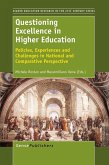The quality of higher education is a hot topic, especially as students around the world are asked to pay more towards their own education, and expect to get what they pay for. In addition, league tables, both national and international, have come to dominate discussion, with several governments, and many institutions, setting themselves the goal of improving their ratings. In this volume Professor Turner examines the assumptions that are being made about what counts as quality, and what the traditional purposes of universities are. But with the growth of mass higher education, and the rise of student centred approaches to learning and teaching, it has become increasingly clear that high quality education is education that meets the needs of the student at that particular moment, and promotes their future development. After examining a range of different approaches to the quality of higher education and its measurement, Professor Turner develops an approach to benchmarking and quality enhancement that is better suited to the ethos of individualised learning, and uses it to critique the philosophies that have dominated debates about quality to date. This book will be of interest to scholars of higher education, but also has something important to add to debates that engage policy makers in higher education. It provides a background to the historical development of universities which might help postgraduate students ad new members of faculty understand the process in which they are engaged.
Dieser Download kann aus rechtlichen Gründen nur mit Rechnungsadresse in A, B, BG, CY, CZ, D, DK, EW, E, FIN, F, GR, HR, H, IRL, I, LT, L, LR, M, NL, PL, P, R, S, SLO, SK ausgeliefert werden.









